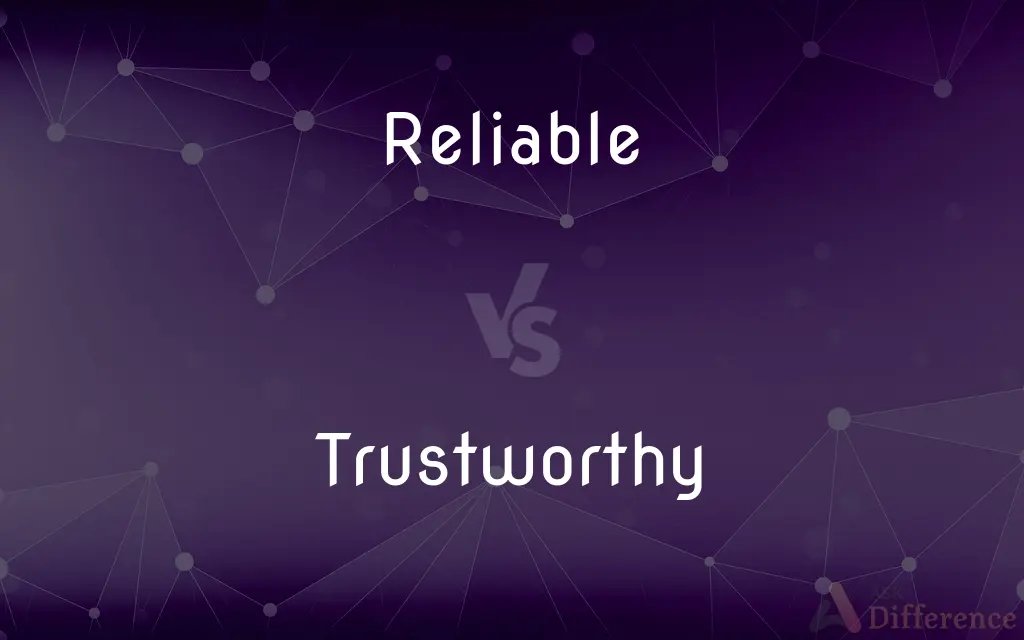Reliable vs. Trustworthy — What's the Difference?
By Tayyaba Rehman & Fiza Rafique — Updated on March 12, 2024
Reliability refers to consistency in performance or behavior, while trustworthiness encompasses reliability, honesty, and integrity in character.

Difference Between Reliable and Trustworthy
Table of Contents
ADVERTISEMENT
Key Differences
Reliability is primarily about the predictability and dependability of an action or system, focusing on the consistent performance over time. It's about whether something or someone delivers the expected results repeatedly. On the other hand, trustworthiness goes beyond just consistent performance to include ethical qualities like honesty, integrity, and moral reliability. It’s not just about doing something well consistently but doing it with the right intentions.
While reliability might be quantified through metrics or performance data, indicating how often a system or person meets the expected standards, trustworthiness is more qualitative, involving judgment of character and intentions. Trustworthiness implies a deeper level of confidence that someone not only can but will act in your best interest, based on ethical principles, whereas reliability focuses on the "can" aspect.
In professional contexts, a reliable employee consistently meets deadlines and maintains a high standard of work. In contrast, a trustworthy employee not only meets these criteria but also handles sensitive information responsibly and makes decisions that align with both the company's and colleagues' best interests. Trustworthiness encompasses a wider range of attributes, including reliability.
In personal relationships, reliability might mean a friend is always on time for meetings, whereas trustworthiness implies that the same friend can be counted on to keep a secret or provide support in tough times. Trustworthiness in this sense includes reliability but adds an ethical dimension to the expectation of support and confidentiality.
Reliability is critical in systems and machines, where consistent performance is paramount for safety and efficiency. Trustworthiness, while also important in these contexts, is more commonly applied to human actions and decisions, where ethical considerations play a significant role. This distinction highlights how the concepts apply differently across contexts.
ADVERTISEMENT
Comparison Chart
Definition
Consistency in performance or behavior.
Reliability, honesty, and integrity in character.
Key Attributes
Predictability, dependability.
Honesty, integrity, moral reliability.
Measurement
Quantified through metrics or performance data.
Qualitative, involving judgment of character and intentions.
Professional Context
Meets deadlines, maintains standards of work.
Handles sensitive information responsibly, ethical decision-making.
Personal Relationships
Always on time, consistent support.
Ethical support, confidentiality, acts in others' best interests.
Application
Primarily in systems and machines.
Commonly applied to human actions and decisions.
Focus
On the capability to deliver expected results.
On ethical principles and the intention to act in good faith.
Compare with Definitions
Reliable
Stability in functioning.
A reliable internet connection is essential for remote work.
Trustworthy
Consistent over time.
He’s reliable; always delivering projects on deadline.
Reliable
Measured by performance data.
Her reliability is evidenced by her sales record.
Trustworthy
Predictable outcomes.
Reliable software provides consistent user experiences.
Reliable
Consistent over time.
He’s reliable; always delivering projects on deadline.
Trustworthy
Dependable in performance.
A reliable car starts every morning without issue.
Reliable
Predictable outcomes.
Reliable software provides consistent user experiences.
Trustworthy
Stability in functioning.
A reliable internet connection is essential for remote work.
Reliable
Dependable in performance.
A reliable car starts every morning without issue.
Trustworthy
Measured by performance data.
Her reliability is evidenced by her sales record.
Reliable
Capable of being relied on; dependable
A reliable assistant.
A reliable car.
Trustworthy
Able to be relied on as honest or truthful
Leave a spare key with a trustworthy neighbour
Reliable
Yielding the same or compatible results in different clinical experiments or statistical trials.
Trustworthy
Warranting trust; reliable.
Reliable
Suitable or fit to be relied on; worthy of dependence, reliance or trust; dependable, trustworthy
Trustworthy
Deserving of trust, reliable.
Reliable
Such that either a sent packet will reach its destination, even if it requires retransmission, or the sender will be told that it didn't
Trustworthy
Worthy of trust or confidence; trusty.
Reliable
Something or someone reliable or dependable
The old reliables
Trustworthy
Worthy of trust or belief;
A trustworthy report
An experienced and trustworthy traveling companion
Reliable
Suitable or fit to be relied on; worthy of dependance or reliance; trustworthy.
The best means, and most reliable pledge, of a higher object.
According to General Livingston's humorous account, his own village of Elizabethtown was not much more reliable, being peopled in those agitated times by "unknown, unrecommended strangers, guilty-looking Tories, and very knavish Whigs."
Trustworthy
Taking responsibility for one's conduct and obligations;
Trustworthy public servants
Reliable
Worthy of reliance or trust;
A reliable source of information
A dependable worker
Reliable
Conforming to fact and therefore worthy of belief;
An authentic account by an eyewitness
Reliable information
Reliable
Worthy of being depended on;
A dependable worker
An honest working stiff
A reliable source of information
He was true to his word
I would be true for there are those who trust me
Common Curiosities
How do you measure reliability?
Reliability is often measured through performance data, like punctuality or task completion rates.
Can a machine be trustworthy?
While machines can be reliable, trustworthiness is more applicable to ethical human actions and decisions.
Why is trustworthiness important in relationships?
It builds deeper bonds of confidence, ensuring that individuals act in each other's best interests.
Can a person be reliable but not trustworthy?
Yes, someone might consistently meet obligations (reliable) but not act with integrity or honesty (untrustworthy).
What makes a person trustworthy?
Honesty, integrity, and acting with good intentions toward others make a person trustworthy.
How does trustworthiness affect leadership?
Trustworthy leaders inspire loyalty and respect, fostering an ethical organizational culture.
How does reliability impact customer satisfaction?
High reliability in products or services leads to increased customer satisfaction and loyalty.
Is reliability enough for trust?
While reliability is important, trust often requires the additional elements of honesty and integrity.
What role does trustworthiness play in professional ethics?
Trustworthiness is foundational to professional ethics, ensuring decisions and actions are made with integrity.
How do societies benefit from trustworthiness?
Societies with high levels of trustworthiness enjoy stronger communal ties and more cohesive social interactions.
How does reliability relate to safety?
In contexts like engineering or healthcare, high reliability is crucial for ensuring safety and preventing errors.
Are trustworthy systems possible in technology?
Trustworthy systems in technology integrate ethical use and data protection principles, beyond mere reliability.
Can trustworthiness be regained once lost?
Regaining trustworthiness is challenging and requires consistent demonstration of honesty and integrity over time.
Can organizations measure trustworthiness?
While challenging, organizations can gauge trustworthiness through ethical culture assessments and stakeholder feedback.
Why is it harder to prove trustworthiness than reliability?
Trustworthiness involves subjective judgments of character and intentions, making it harder to quantify than reliability.
Share Your Discovery

Previous Comparison
Clean vs. Neet
Next Comparison
Skinwalker vs. WendigoAuthor Spotlight
Written by
Tayyaba RehmanTayyaba Rehman is a distinguished writer, currently serving as a primary contributor to askdifference.com. As a researcher in semantics and etymology, Tayyaba's passion for the complexity of languages and their distinctions has found a perfect home on the platform. Tayyaba delves into the intricacies of language, distinguishing between commonly confused words and phrases, thereby providing clarity for readers worldwide.
Co-written by
Fiza RafiqueFiza Rafique is a skilled content writer at AskDifference.com, where she meticulously refines and enhances written pieces. Drawing from her vast editorial expertise, Fiza ensures clarity, accuracy, and precision in every article. Passionate about language, she continually seeks to elevate the quality of content for readers worldwide.














































